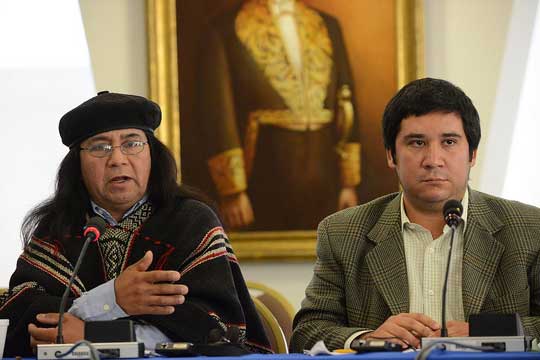



March 19, 2015 | By Andrew F. Mutavdzija; Translated to Spanish by Rodrigo Soria del Villar
Vea este artículo en español aquí

Petitioners Jorge Huege of Parlamento Mapuche Koz Koz and Hernando Silva of Observatorio Ciudadano address commissioners regarding the effects of extractive industries on their people and communities in Chile. (courtesy of Inter-American Commission on Human Rights)
Commissioners: Rose-Marie Antoine, James Cavallaro, Paulo Vannuchi
Petitioners: Jorge Hueqe (Parlamento Mapuche Koz Koz) and Hernando Silva (Observatorio Ciudadano).
State: Chile
Petitioners appeared before the Inter-American Commission on Human Rights (IACHR) and representatives of the Chilean government on March 17, 2015, laying out grievances related to the practices of the extractive industries and their effects on the Mapuche people. The indigenous Mapuche people of Chile are engaged in efforts to establish community benefits related to new mining, fishing, and other extractive industry developments with the goal of protecting residents’ livelihoods and quality of life. Petitioners argue that the government has not supported and even resisted their efforts, which may put Chile in violation of Articles 1 and 47 of the International Covenant on Civil and Political Rights (ICCPR), which recognizes all citizens’ rights to enjoy, use, and freely dispose of their natural resources.
Petitioners’ testimony began with a brief history of the Mapuche people in Chile and the land grabs they experienced under former Chilean dictator, Augusto Pinochet. The land grabs divided and transferred the Mapuche people’s communal lands to individual owners. The IACHR documented the land grabs as early as the1979-1980 Annual Report of the IACHR.
The Mapuche contend that nothing has changed over the decades. National and international investments in their home territory has exacerbated their situation not just with regard to land, but natural resources that have been taken from them as well. The Petitioners stated that the companies involved in the developments have not been following Law 19,253 of 1993, which protects the rights of indigenous people in Chile. The companies and the government have ignored the process of prior consultation and informed consent related to industry expansion and denied the inhabitants’ rights to participate in the benefits of the projects. Petitioners provided examples of abuses and violations, including laws granting the forestry industry great operational leeway and little oversight, allowing in invasive species destructive to the regional ecosystem; a constant threat of new hydro-electric projects in the foothills of the Andes Mountains; invasive species brought in by the salmon industry; and the preferential treatment for mining companies, with no regard for environmental concerns or indigenous people. The Petitioners noted that, though Chile is a signatory to numerous free trade agreements, the indigenous people are denied the opportunity to have a say over their own property.
In their response, the Chilean representatives emphasized that a new government has come to power with President Michelle Bachelet’s return to office in 2014. It recognized a “historic debt” to Chile’s indigenous people and stated that International Labour Organization (ILO) Convention 169, which Chile ratified in 2008, figures very prominently into its intent to comply fully with its international obligations regarding the rights of indigenous people.
Chile acknowledged that businesses can contribute to progress but negatively impact human rights. Thus, it is committed to the 2011 United Nations Guiding Principles on Business and Human Rights. As a demonstration of its commitment, Chile introduced a resolution at the last meeting of the Organization of American States (OAS) in Paraguay that urges states to continue to promote the application of the guiding principles and to spur conversations.
The Chilean response included many statements demonstrating its commitment to existing agreements and to initiating dialogue with stakeholders related to the development of land. Chile is planning a study to identify existing practices and legal and regulatory gaps related to businesses and their impacts on human rights. They have organized a summit this spring to announce a national human rights and business plan and took this opportunity to invite the Mapuche people to participate.
Commissioner Rose-Marie Belle Antoine asked about the status of new laws that the Chilean President announced, which would ensure that indigenous leaders who take peaceful protest action are not criminalized. She also asked about the situation of private ownership over water resources, which she labeled a tremendous concern. Commissioner James Cavallaro expressed his concerns with water rights, as well. Commissioner Paulo Vannuchi asked whether representatives of the indigenous populations could have space on the agenda at the April summit to express their concerns orally to business representatives in attendance.
The Petitioners briefly responded, noting that ratification of ILO Convention 169 was not borne out of the President’s goodwill, but from major pressure by indigenous people and activists. They also expressed skepticism that their voices would be heard at the upcoming summit. Chile said it is waiting for legislative reform recommendations from an advisory committee to be drafted into bills, but that the administration will not enforce the current law against indigenous people. Regarding water rights, the Chilean government representatives said the government is still operating under the 1980 Constitution and that amending the Constitution could be an opportunity to address structural issues related to indigenous populations. Finally, they invited Commissioner Vennuchi, the Mapuche people, and other stakeholders to participate in the April summit.
Source: Human Rights Brief